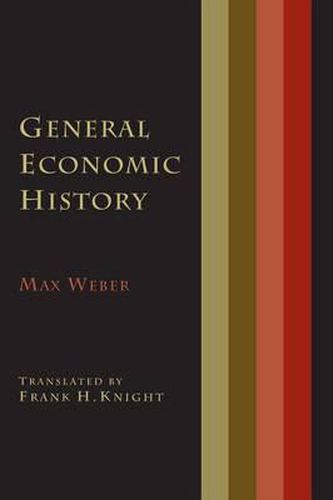Readings Newsletter
Become a Readings Member to make your shopping experience even easier.
Sign in or sign up for free!
You’re not far away from qualifying for FREE standard shipping within Australia
You’ve qualified for FREE standard shipping within Australia
The cart is loading…






2013 Reprint of 1927 Edition. Exact facsimile of the original edition, not reproduced with Optical Recognition Software. Max Weber’s General Economic History is based on his lecture notes and compiled shortly after his death. In this work Weber proposes an institutional theory of the rise of capitalism in the west. Unlike in his classic work on the Protestant ethic, religion is given a minor role. The emphasis of the work lies instead on the place of the state and calculable law in allowing economic actors to predict exchange for gain. Weber’s institutional theory of capitalism was rediscovered in the early 1980s by writers like Randall Collins, Daniel Chirot, and Douglass C. North, who worked to replace theories based largely on Immanuel Wallerstein’s World Systems theory. Though today read primarily by sociologists and social philosophers, Weber’s work did have a significant influence on Frank Knight, one of the founders of the neoclassical Chicago school of economics, who translated Weber’s General Economic History into English in 1927.
$9.00 standard shipping within Australia
FREE standard shipping within Australia for orders over $100.00
Express & International shipping calculated at checkout
2013 Reprint of 1927 Edition. Exact facsimile of the original edition, not reproduced with Optical Recognition Software. Max Weber’s General Economic History is based on his lecture notes and compiled shortly after his death. In this work Weber proposes an institutional theory of the rise of capitalism in the west. Unlike in his classic work on the Protestant ethic, religion is given a minor role. The emphasis of the work lies instead on the place of the state and calculable law in allowing economic actors to predict exchange for gain. Weber’s institutional theory of capitalism was rediscovered in the early 1980s by writers like Randall Collins, Daniel Chirot, and Douglass C. North, who worked to replace theories based largely on Immanuel Wallerstein’s World Systems theory. Though today read primarily by sociologists and social philosophers, Weber’s work did have a significant influence on Frank Knight, one of the founders of the neoclassical Chicago school of economics, who translated Weber’s General Economic History into English in 1927.